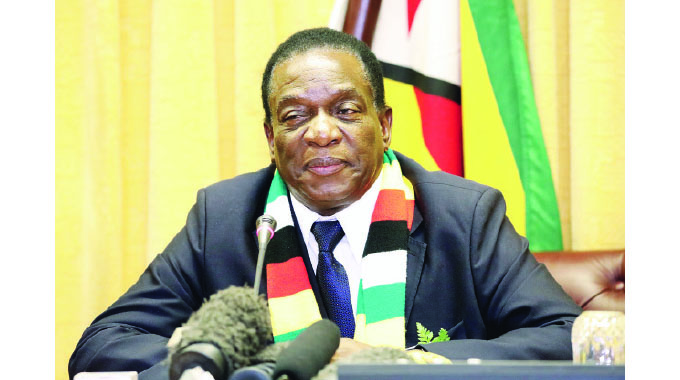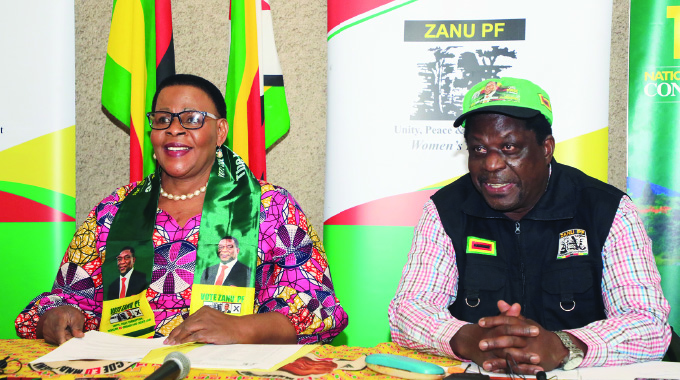Economy now essence of foreign policy success

Gibson Nyikadzino Diplomatic Telescope
No country has ever achieved successful economic development without integrating with the world economy, a historical fact of great importance.
The dictum “it’s the economy, stupid!” continues to maintain its predictive power in which foreign policy has become importantly hinged on the economy, a variable driving growth by using negotiations as a basis of economic growth.
Zimbabwe’s economy has been growing.
For purposes of avoiding debate with naysayers, official statistics and projections from the World Bank state that Zimbabwe’s economy is expected to grow faster than its neighbours, rising from 3,9 percent in 2021 to 5,1 percent in 2022.
These are not voodoo projections, but scientific data from a “renowned” institution.
To arrive at these conclusions, five pillars characterised President Mnangagwa’s 2018 election campaign.
His message as espoused in Zanu PF’s manifesto was themed as: “Unite, Fight Corruption, Develop, Re-engage and Create Jobs.”
While unity, fighting corruption, development and job creation cannot be wished away, the same goes for Zimbabwe’s “re-engagement and engagement” agenda.
This writer recognises that today’s world is one of profound new economic and political realities, which have magnified the importance of balancing diplomacy and trade as key leverages to economic growth and development.
Of particular interest is Zimbabwe’s two pillars of co-operation that can be read as the re-engagement and engagement policy fronted by President Mnangagwa.
The “re-engagement” pillar and the positive achievements Zimbabwe has so far registered in its regional, continental and international obligations prompted the midwifery of this bi-monthly column: Diplomatic Telescope.
Telescopes have generally been used by explorers and other people who took on their adventures and excursions.
Early telescopes were primarily used for making earth-bound observations, such as surveying and military tactics. Because of the telescope’s ability to see more deeply, it has three basic powers it provides: magnification, resolving power, and light-gathering power.
This is what this space entails to highlight on the diplomatic and foreign policy front by Zimbabwe under the re-engagement and engagement policy.
The goal of this column, too, is to be perspectival without losing track of Zimbabwe’s foreign policy goals, bringing to light and simplifying what is happening in all far and wide territories where Zimbabwe has interests of engagements in, like what the telescope does, reaching out to far objects and bringing them close.
It is a column of “national interest”.
This country’s foreign policy is hinged on the need to safeguard state sovereignty, state survival, economic growth, Pan-Africanism, regional weight and influence.
These areas have been remarkably developed.
The changing nature of the rules of diplomacy and engagement over the past years continues to open new frontiers for diplomatic actors with negotiation odds tilting in favour of conversations towards the economy.
It also calls for a correct application of the mind in interpreting Zimbabwe’s foreign engagements in the post-November 2017 era.
When Zimbabwe sends Covid-19 vaccines to Namibia or receives vaccines from China, it is neither a weakness nor a risky gesture.
It is understanding through acts what drives and informs the human-security nexus and political values more than the elements of individuality in the face of a pandemic.
Diplomacy does not exist solely on the international level.
This also calls for the balancing of bilateral and multilateral engagements for Zimbabwe.
For instance, China and Russia are Zimbabwe’s all weather allies. Therefore, how should Zimbabweans interpret the country’s appearance at the COP26 Glasgow summit where Russia and China did not go?
Similarly, how do we interpret Zimbabwe’s decision to vote against a UN resolution to condemn Russia?
These are issues that must not be looked at superficially, but need an “inner foreign policy eye”, just to borrow and alter Prof Lovemore Madhuku’s “inner legal eye” submission.
Zimbabwe’s foreign policy is important as it highlights the sentiment of the Zimbabwean Government as strongly determined by factors including national interest, cultural values, resource availability, national power and sanctions among others.
While anti-Zimbabwe local merchants and neo-colonial clerks disparage the motherland from a politically deficient point of view, the interpretation of Zimbabwe’s diplomatic strides can only be understood from a national interest point of view in order to appreciate the challenges and opportunities that come in this field.
Since 2018, under the arm of “re-engagement”, Zimbabwe has highlighted that it is an enemy of none.
This has helped maintain an open-door policy and warmly interactions to countries who since the 2000 Land Reform Programme have not been friendly to Zimbabwe.
Efforts to re-engage have happened despite the Western generated acrimony towards Zimbabwe.
At the same time, on the “engagement” arm, Zimbabwe opened three new diplomatic frontiers in Rwanda, Turkey and the United Arab Emirates (UAE).
The country is maintaining a diplomatic balance in its quest to advance its economic interests for the benefit of the citizens, which is the goal of any foreign policy interaction with the external world and the responses of other actors to these interactions.
A critical interpretation of Zimbabwe’s foreign policy footprints under the architectural guide of “re-engagement and engagement” is something citizens, intellectuals and policy makers should not turn a blind eye to.
Every diplomatic step matters. It is anticipated that results can be slow, that is the arduous nature of diplomacy, it happens where there is a lot of negotiation.
After a radically hostile anti-West diplomatic stance by the previous administration, Zimbabwe was isolated economically and politically by many Western nations.
With the world becoming evolutionary in an economic sense, traditional diplomacy that prioritised force and hard power, though apparent in some instances, is being replaced by economic engagements.
What should be noticed is that at the closure of almost every political summit, talk of “fostering economic integration and ties” has become dominant the world over. Whether it is by the SADC countries, AU member states and any other bloc, the economy is taking a centre stage in diplomacy. As a result, traditional diplomatic tools such as bilateral meetings and diplomatic etiquette disappear and businessmen turn into diplomats.
It informs why President Mnangagwa has been and is at the World Economic Forum in Davos, where business meetings are the order of the day.
Trade deals and investment opportunities are the premise in which in his inauguration speech on November 24, 2017 President Mnangagwa said Zimbabwe’s priority was the economy, the country is “Open for Business” and also his addition of the “international trade” component in the Ministry of Foreign Affairs.
No wonder at the Davos meeting in January 2018, the interview granted to the host of CNN Money Richard Quest by President Mnangagwa was of an economic foreign policy nature that emphasis on politics.
These are the fundamental changes that the world is currently experiencing at an unprecedented rate where diplomacy is becoming a tool in the hands of business people.
Economic statecraft is now a powerful and diverse tool of foreign policy for it is an effective way to influence other countries.
Economic ties are now a focal point of international relations as trade is central to ending national and world poverty.
Today, the economy has become central in diplomacy, and at the same time that has taken on a more complex and vital character.
There are plenty of powerful interests that are now involved in international trade and investment, including multinational corporations and international banks.
Diplomacy is also now a public display through use of platforms like Twitter, publicly negotiating trade agreements to reduce trade barriers bilaterally or multilaterally and to promote economic growth for public benefit.
In this Diplomatic Telescope column, the mind will be frankly applied without diluting the national interest.









Comments